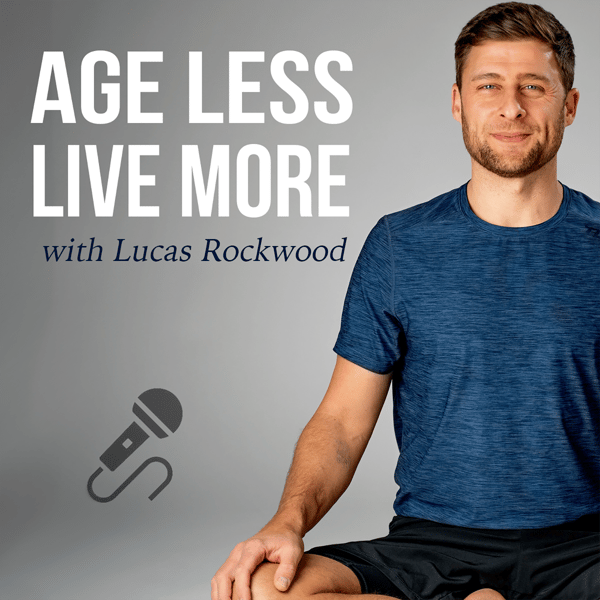383: The Nocturnal Brain With Dr. Guy Leschziner
Age Less / Live More
Lucas Rockwood
4.8 • 1.1K Ratings
🗓️ 30 October 2019
⏱️ 44 minutes
🧾️ Download transcript
Summary
You close your blackout curtains, flip your phone to airplane mode, and crawl into bed with all the best intentions to get 7.5 hours of sleep—and then your monkey mind starts peeling bananas.
Work deadlines stream through your mind, the next episode of your current favorite series beckons, and for no good reason, you’re dying to see what your friends are posting on Instagram. Thirty minutes pass, and more of the same. You’re now worried you’ll have raccoon eyes at the office meeting in the morning, but that thought just makes things worse. You finally fall asleep at 2:00 am and manage just four hours of sleep. Sound familiar?
Many people overcome this by drinking half a bottle of red wine, puffing on a CBD vape pen, or popping an Ambien—but these are all Band-Aids. The underlying problem has not been solved. You’ve got a sleep problem, and it needs to be fixed.
Sleep expert Dr. Guy Leschziner dedicates his work to the diagnosis and treatment of sleep disorders, and he’s my guest on this week’s show.
Listen & Learn:
- Why 50% of your sleep tendencies are likely inherited
- How to intelligently use sleep apps and other consumer tracking devices
- Why REM sleep is not fully understood and can even be problematic
- How sleep problems and mental health are very much a chicken and egg problem
- How to know when to get professional medical help
Links & Resources
About Our Guest
Guy is the clinical lead for the Sleep Disorders Centre at Guy's Hospital, which is one of Europe's largest sleep units. He is also Reader in Neurology at the Department of Clinical Neuroscience, Institute of Psychiatry, Psychology and Neuroscience at King's College London. His new book The Nocturnal Brain: Nightmares, Neuroscience and the Secret World of Sleep is available now.
Nutritional Tip of the Week:
Apples vs Oranges
Got Questions?
- Send me a voicemail here: Ask Lucas a Question
- Or write to us: [email protected]
Like the Show?
- Leave us a Review on iTunes
Transcript
Click on a timestamp to play from that location
| 0:00.0 | I got into bed at 11 30 last night and I fell asleep at 3 o'clock and unfortunately |
| 0:10.4 | this is a pretty common routine for me. |
| 0:12.6 | If you're a regular listener to the show, |
| 0:14.6 | you know that sleep has always been my biggest health challenge |
| 0:18.3 | and continues to be. |
| 0:19.2 | I've been on a pretty good tear here for a couple of years, |
| 0:21.9 | but at least once, twice a week I have a problem and last night was one of those. |
| 0:27.0 | And then I woke up today and recorded this podcast, which is very fitting. |
| 0:31.0 | I thought I'd share some key findings and statistics about sleep. |
| 0:35.1 | These are US statistics but they apply pretty much around the world as well. |
| 0:40.0 | So 35% of Americans don't get seven hours of sleep, |
| 0:44.1 | which is recommended at least seven. |
| 0:46.8 | And in 1910, so let's just call it 100 years ago, |
| 0:50.6 | the average person slept nine hours a night and the difference between you know six seven hours and nine hours |
| 0:56.6 | When you stack that over months and years is really really significant in terms of here |
| 1:01.0 | Stress levels your mental and emotional health, especially your |
| 1:04.4 | etiquette system, your hormones. The effects of lack of sleep are really, really massive, huge |
| 1:11.6 | problems. So here's what we're looking at, two and ten people in the |
| 1:16.1 | U.S. have a sleep disorder. What would that be? Well the common things are restless, |
| 1:20.5 | leg syndrome, sleep apnea, this is where you're actually stopping breathing |
| 1:24.8 | multiple times throughout the night insomnia which is what I suffer from |
| 1:28.0 | rhem sleep behavior disorder this is where you instead of being relaxed during your deep sleep you're |
... |
Please login to see the full transcript.
Disclaimer: The podcast and artwork embedded on this page are from Lucas Rockwood, and are the property of its owner and not affiliated with or endorsed by Tapesearch.
Generated transcripts are the property of Lucas Rockwood and are distributed freely under the Fair Use doctrine. Transcripts generated by Tapesearch are not guaranteed to be accurate.
Copyright © Tapesearch 2025.

